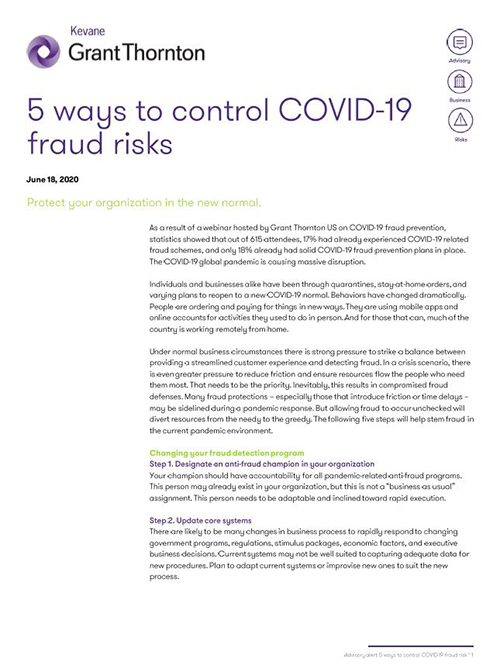Protect your organization in the new normal.
As a result of a webinar hosted by Grant Thornton US on COVID-19 fraud prevention, statistics showed that out of 615 attendees, 17% had already experienced COVID-19 related fraud schemes, and only 18% already had solid COVID-19 fraud prevention plans in place. The COVID-19 global pandemic is causing massive disruption.
Individuals and businesses alike have been through quarantines, stay-at-home orders, and varying plans to reopen to a new COVID-19 normal. Behaviors have changed dramatically. People are ordering and paying for things in new ways. They are using mobile apps and online accounts for activities they used to do in person. And for those that can, much of the country is working remotely from home.
Under normal business circumstances there is strong pressure to strike a balance between providing a streamlined customer experience and detecting fraud. In a crisis scenario, there is even greater pressure to reduce friction and ensure resources flow the people who need them most. That needs to be the priority. Inevitably, this results in compromised fraud defenses. Many fraud protections – especially those that introduce friction or time delays – may be sidelined during a pandemic response. But allowing fraud to occur unchecked will divert resources from the needy to the greedy. The following five steps will help stem fraud in the current pandemic environment.
Changing your fraud detection program
Step 1. Designate an anti-fraud champion in your organization
Your champion should have accountability for all pandemic-related anti-fraud programs. This person may already exist in your organization, but this is not a “business as usual” assignment. This person needs to be adaptable and inclined toward rapid execution.
Step 2. Update core systems
There are likely to be many changes in business process to rapidly respond to changing government programs, regulations, stimulus packages, economic factors, and executive business decisions. Current systems may not be well suited to capturing adequate data for new procedures. Plan to adapt current systems or improvise new ones to suit the new process.
Step 3. Ideate fraud schemes
In these uncertain times, it is even more important to be proactive in identifying new threats. Establish a team to evaluate these emerging fraud schemes and gather intelligence from peers, regulators, and partners. Collaborate with cybersecurity teams to leverage existing threat intelligence sources.
Step 4. Leverage unsupervised detection techniques
While supervised modeling techniques may not provide the greatest accuracy when behaviors change dramatically, unsupervised methods can provide greater lift. Anomaly detection, network analytics, and expert rule systems can all add immediate value.
Step 5. Iterate and adapt
Fraud detection is not a “set-and-forget” process. Expect the threat landscape to evolve over time. Explore the use of robotic process automation, alert hibernation, and other methods to help deal with the increased volume of alerts that fraud teams are likely to encounter.
All indications are that fraud will increase dramatically in the coming months. With these steps, organizations can be better prepared to address this new wave of fraudulent activity, protect the assets of their organization, and ensure that resources are available for legitimate uses – especially those who need them most. The COVID-19 pandemic presents novel challenges and a chaotic business environment. By focusing now on cash flow and liquidity, you can provide your business with the financial cushion and flexibility to weather the storm.
Source: Grant Thornton library articles


